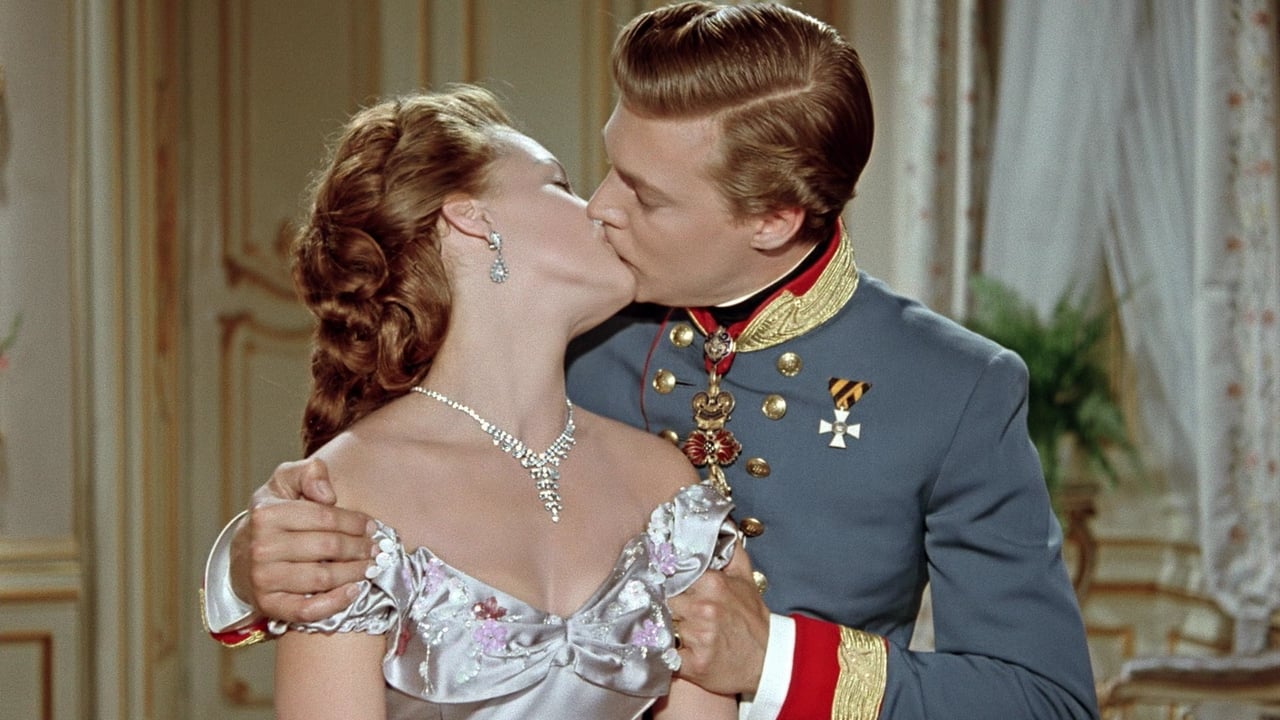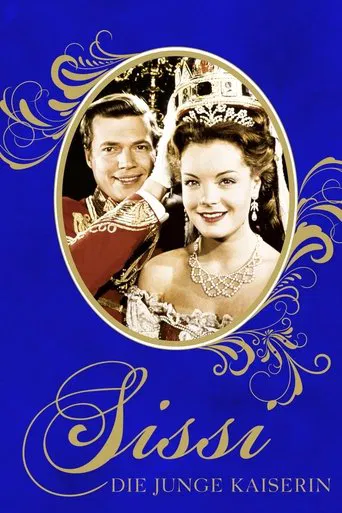Ameriatch
One of the best films i have seen
Skunkyrate
Gripping story with well-crafted characters
Pluskylang
Great Film overall
Contentar
Best movie of this year hands down!
kekseksa
In an earlier review of the first Sissi film, I pointed out that the historical significance of this trilogy lies not so much in its account of the Austrian Empire before the First World War (this is totally fairy-tale history) but in its relevance to the post-war German world.Germans (particularly young Germans) were in a constant state of denial in the fifties and sixties. As late as the seventies I taught groups of West German students who would were not even willing to express an opinion about the possible future reunification of a still divided Germany and of course steered well away from any discussion of the unfortunate events of 1933-1945 - the "you know what" of the German world.Austria, spared by a sort of political conjuring trick from all implication in German nastiness, served as a wonderful alibi for the pan-German world and was the natural setting for a sumptuous epic (a film of the kind that Germany itself now avoided making).Romy Schneider and Karlheinz Böhm were the ideal representatives of the new generation, expressive at once of continuity and reborn innocence. Both had parents who were in fact closely implicated in the period no one talked about. Magda Schneider, who appears of course as her daughter's mother in the films, had been a neighbour and close friend of Hitler (she still lived in Bechtesgarten) and had also been, according to herself at any rate, his favourite actress. The conductor Karl Böhm had belonged to a quasi-Nazi cultural organisation (formed by the very racist Alfred Rosenberg)and had publicly and ostentatiously welcomed the annexation of his native Austria in 1938. Romy and Karlheinz of course had both been at boarding-school and were innocent of any such associations.The average German did not so much want a break with the past but to establish a line of continuity that made the past somehow OK (even the "you know what"). It might be mildly critical of those nasty Nazis (as in the highly popular film Die Trapp-Familie, which came out in the same year as this second Sissi film, but were not prepared, understandably enough, to accept the burden of collective guilt for the past. Even The Sound of Music, the gooey Hollywood musical based on the German 1956 film, was felt by German audiences (despite the edelweiss) to be too strongly critical of the unmentionable past.In the second Sissi film, there is the same pan-Germanic context as in the first (Bavarian beer and Bavaraian pigs' trottters, the Tyrol and edelweiss are not forgotten) but the historical events (the Hungarian unrest and Sissi's fondness for Hungary are accurate) allow an expansion of the pan-Germanic space, balm to the soul of a divided Germany, beyond the German-Austrian world portrayed in the first film to include Hungary, traditionally very strongly linked, culturally and politically, with the German world but in 1956 a Communist state under Russian tutelage. It is not too difficult to appreciate the importance of this in 1956, the year of the Hungarian rising against the Communist government and its suppression by Soviet troops. The link was widely commented upon in the contemporary press and 350 Hungarian refusgees weer invited to the film's première at the Mozart-Kino.In 1954 Leni Riefenstahl's Tiefland was released in Germany, controversial because it had been made during the war and had made use of concentration-camp inmates as gypsy extras. Faced by a hostile press campaign, Riefenstahl ttok refuge in Austria. Her tour there was, in her own words, "a roaring success". In this film Mariscka hired gypsy extras for the crowd-scenes in Hungary, a fact frequently emphasised in the publicity for the film. Today a reunited Germany sees itself once again as the centre of the culture of Mitteleuropa but, even in the days when such things weer not spoken of, that cultural imperium remained close to the heart of most Germans. As Germany increasingly flexes its muscles and begins to talk incessantly once again of rearmament, let us hope that the future of that Central European imperium proves closer to the fairy-tale world of this trilogy, where even the reactionary autocrat Franz Josef is displayed as a benevolent liberal, than to the darker reality of the "you know what".
pefrss
I grew up with the Sissi movies and was a big fan of Romy Schneider in my youth. Later in life I researched the life of the Empress and the life of King Ludwig II a little bit more thoroughly. Of course I found out that the multiple movies made about these two popular royalties were all sugarcoated and in many aspects far from reality. This said, up to today I put on the Sissi movies to relax. I enjoy just about everything in it and like them as a fairy tale. A fairy tale with castles, kings, princesses and the wicked mother in law. I never visited Hungary and thoroughly get pleasure from the scenes showing this beautiful land. In many ways the movie is also realistic.My father grew up under a Kaiser, so the lifestyle is not too far removed from what I experienced. Children of influential families were nearly always brought up by governesses and saw their parents only at "audiences". Duty to the Fatherland was something which was taught to everybody and of course even more so to the royalties. Marriages in high circles were always arranged and a marriage out of love practically unheard of. So the film paints also a picture of the time these people were living in. I think the Sissi trilogy may be the only movies which stayed with me all my life.
blanche-2
Romy Schneider is "Sissi: The Young Empress," Empress Elisabeth of Austria, in this 1956 film, the second of the popular trilogy. Schneider was nearly 18 at the time, and absolutely beautiful and charming in the role.I need to say here, for anyone non-European or anyone who has not spent time in Austria, Germany, Hungary, etc., Sissi was the Princess Diana of her day and in fact, remains popular. Her face is on everything from candy wrappers to pins, pocket watches, necklaces - she's everywhere. She's been the subject of musicals, countless books, TV miniseries, plays, and films.As others have pointed out, this is an idealized story of Sissi, with lots of facts left out as well as the more negative aspects of Sissi's personality - her anorexia, for one. Here, she is still in the honeymoon phase with her husband, the Emperor Franz Josef; and she is also anxious to help to build a good relationship with Hungary.Sissi runs into problems when she becomes pregnant with her daughter Sophie, and her mother-in-law, convinced that Sissi is too young to be a good mother, takes the child from her in order to raise her. Angry that Franz will not stand up to his mother and instead, takes her side, Sissi leaves him and returns home to her family. It's pointed out to her that she has duties as a royal that must be fulfilled.In actuality, Sissi's mother-in-law was worse to her than shown in the film. Also, by the time she becomes Queen of Hungary, she has three children but the film only speaks of one, Sophie, who by then is deceased.These films are incredibly popular in Europe and I believe are shown at Christmas. The color is beautiful, the costumes and furnishings are gorgeous - these films are truly a treat for the eyes.Read up on Sissi to get the real story, and enjoy these romanticized films for what they are: Sissi-lite.
Marcin Kukuczka
Whenever I see this part, it seems to me that Ernst Marischka wanted to show Sissi as a gentle woman who is exposed to the hardship of royal life. In spite of the fact that the film is full of sweet images (like other parts) which may seem to some people "out of date", it has a certain message conveyed.In fact, this part's content is built upon two issues: politics and the family life in imperial palace. Sissi, as a young empress, has to get used to the lifestyle in the palace. She finds it difficult, especially due to the attitude of her mother in law, archduchess Sophie. The problems grow when Sissi gives birth to her daughter and the baby is taken from her. Sophie thinks that Sissi is too young to be a good mother. She has to choose: be an empress and forget about mother's feelings or escape from the golden cage...Another interesting fact about the movie is the political situation of Hungary. Sissi loves this nation and aims at uniting it with Austria. Obstacles, however, are huge. Nevertheless, she does not give in and, in the long run, her goals are achieved.I loved the scene when she thinks of leaving Vienna due to family problems, but the Hungarians are waiting for the meeting. She decides to take part in it. Here, Marischka shows the price she had to pay. The duty of an empress is more important than the family, the beloved baby and personal happiness. As her mother Ludovika says to her that she has a duty and has to be strong to fight her emotions.At the end, I must admit that I cried when Sissi becomes the queen of Hungary, swears to fulfill her duties and the Hungarian anthem is being sung (so much forbidden in the time when this nation was persecuted): "Isten, Aldd Meg A Magyart, Jo Kedvvel Boeseggel..." Sissi cries. This is the love for the nation. This is the right attitude of a queen. Sacrifice even her happiness for the sake of fulfilling her duties.I love this part of Sissi. It has much to say to our times, in which the feeling of duty and a good motherhood have been distorted and lost. Especially, young mothers should see it. Marischka shows the love of a mother to her child and the love of a queen or empress to her nation.WORTH WATCHING. CLASSIC!!!

